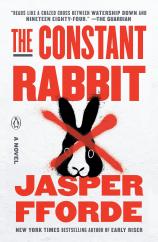The Constant Rabbit
Review
The Constant Rabbit
Jasper Fforde made quite a name for himself with his Thursday Next series of adventure fantasies set in an alternate-history Britain. A few Nursery Crime books and a couple of other stand-alone titles dropped in for good measure, and Fforde most definitely has endeared himself to a wide readership. Now, as ever, he lays out an equally absurd but poignant Britain that explores themes of fear and prejudice in THE CONSTANT RABBIT.
And the absurdity begins immediately. Libraries are regulated to be open for only six minutes. As such, Peter Knox organizes the Buchblitz in an effort to maximize efficiency and aid the librarian, while working with a staff that uses false identities named after British prime ministers. Right? Who does that?
Then Connie comes in. Why should this be absurd? Well, Connie is a rabbit. No, seriously. She’s a rabbit. A human-sized rabbit.
"There is often a deeper story under the absurdly entertaining tale, and that is exactly true for THE CONSTANT RABBIT.... At the very least, Fforde continues to make the case that he is among the best satirists of our time."
You see, in this otherworld created by Fforde, the 1960s experienced an Anthropomorphic Event whereby human-sized rabbits, as well as other critters, came into being. But now, with the UK Anti-Rabbit Party in control, designs are underway to shunt all the rabbits to Wales, where they will be confined in a massive walled enclosure. Anti-Rabbit sentiment is at an all-time high.
Peter is a “spotter,” a job he secured because of his ability to tell individual rabbits apart from one another. To most people, all rabbits look the same. Subtle, right? So while he works for UKARP, he also is torn by his relationship with Connie, who he knew from his days at university.
Personally I found it charming and witty that Peter would be the name of the hero in a book about rabbits, but maybe that’s just me. Peter is a bit in over his head, and as the plot hurtles toward violence culminating in the Battle of Mays Hill, he eventually has to choose a side. Follow his family, in particular his daughter, who is an Anti-Rabbit activist, or side with Connie (Constance...Constant?) and the rabbits.
In the present times in which we find ourselves, there is a lot of preaching and finger-pointing to be had in terms of trying to find any way possible to cancel anyone for anything and to always make every argument about differences, particularly race. It can become a tiresome and uninteresting slog.
With THE CONSTANT RABBIT, Fforde is quite unabashedly playing out the fears of the UK as they pertain to the non-British resident and immigrants, but he also toys with the same arguments the world over, including our own troubles here in the US. It is a book about human-sized rabbits, sure. But it is also about the examination of the other and how the other is treated.
Admittedly, at times it can be a bit overdone. When every newspaper, every news story, every streaming service special suggested playlist, every sporting event, every concert and every novel are about beating you over the head with how bad the world is and how it is your fault, it is easy to grow weary of the story. Looking for entertainment to spend some time away from such things is becoming a harder task.
Yes, Fforde subtly and often not so subtly explores all of this. At the same time, because it’s not new for him to explore such ideas within his work, you’re accustomed to such things. There is often a deeper story under the absurdly entertaining tale, and that is exactly true for THE CONSTANT RABBIT. In the end, one can enjoy it merely as entertainment. He creates a spectacular culture for the rabbits, and the rabbit references alone are worth the effort to get into this work. At the very least, Fforde continues to make the case that he is among the best satirists of our time.
Reviewed by Stephen Hubbard on October 2, 2020




